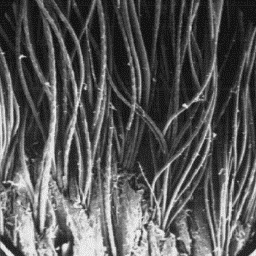 Lutra lutra
Lutra lutra
-----------
English: Otter
German: Fischotter
French: Loutre
Spanish: Nutria de rio
Distribution areas
------------------
This continental species of otter can be
found throughout Europe and in East Asia.
Similar species are found in other parts of
the world; there are eleven known species.
Description of the fur
---------------------- The surface structure
This skin is from 70 to 150 cm long. The of the skin, 100x
under-fur layer is dense, light-brown in
colour and about 6 to 12 mm thick. The coarser hairs are light or dark-brown
in colour and about 15 to 25 mm in length. The belly and the neck are lightly
coloured. Some otters are grey in colour.
|
|
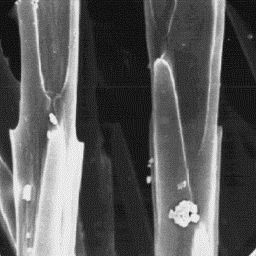 Lutra lutra
Lutra lutra
-----------
English: Otter
German: Fischotter
French: Loutre
Spanish: Nutria de rio
Structure of the hair
---------------------
The microscopic structure of the skin
surface is furrowed; the hair follicles are
wide with sunken edges. The majority of the
follicles contain a cluster of hairs.
The fine fur fibres are from 8 to 22 µm
in diameter. The cross-sectional outline is The cuticular structure
circular at the bottom of the fibre but, in of the fine fibres, 2000x
the middle and upper parts, it is
aster-like or straight-sided. The lowest part of the cuticle is covered with
cornet-like scales but the predominant type of scale is petal-like. The scale
surface is smooth and the scale margins are straight. These fine fibres are
non-medullated.
|
|
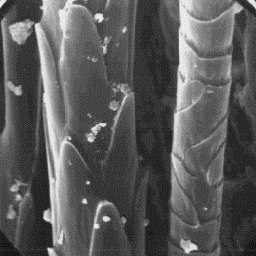 Lutra lutra
Lutra lutra
-----------
English: Otter
German: Fischotter
French: Loutre
Spanish: Nutria de rio
The intermediate fibres are from 30 to
65 µm in diameter. The cross-section is
circular or ellipsoidal, and the shafts are
covered by petal-like or, in the upper
parts, wavelike scales. The scale surface
is either smooth or grooved. The scale
margins are straight or, in some cases,
rippled. These intermediate fibres are
non-medullated. A group of hairs of the fine
and guard type, 2000x
The guard hairs are from 70 to 120 µm in
diameter. The cross-sectional outline at the bottom of the shaft is circular
and, in the upper parts, ellipsoidal. The overall shape of the cuticular
scales is even tile-like in the lowest part, and crenated tile-like in the
middle and upper parts, of the shafts. The scale surface is smooth, and the
scale margins are straight or rippled. The medulla is unbroken, narrow,
central symmetrical-shaped in cross-sectional outline and belongs to the
fractured uniserial ladder type or, on the whole, to the tubular type. The
infilling medullar substance is amorphous.
|
|
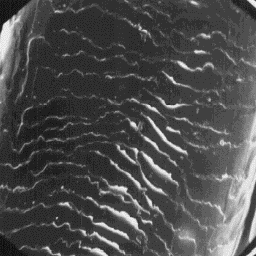 Lutra lutra
Lutra lutra
-----------
English: Otter
German: Fischotter
French: Loutre
Spanish: Nutria de rio
The cuticular structure
of a guard hair, 1000x
|
|
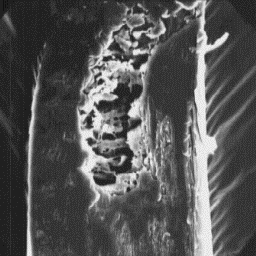 Lutra lutra
Lutra lutra
-----------
English: Otter
German: Fischotter
French: Loutre
Spanish: Nutria de rio
Transverse section
of an intermediate fibre, 600x
Numerical code for otter skin structure
---------------------------------------
Surface of the skin: 3-1-3
Fine fur fibres: 7.1-1.2-1-1-4-0-0-0-0-8.25-5.18
Intermediate fibres: 2.1-11.7-1.2-1-4-0-0-0-0-30.65-16.25
Guard hairs: 2.1-2.4-1-1.2-3-1-1-3.12-8-70.121-18.28
|




